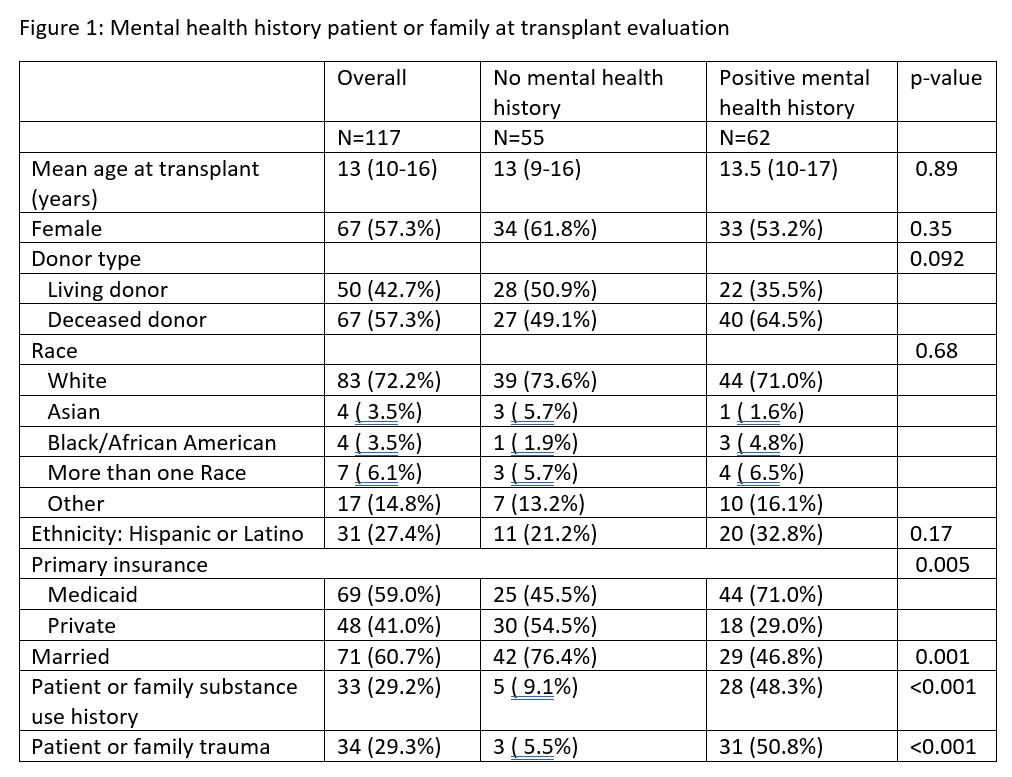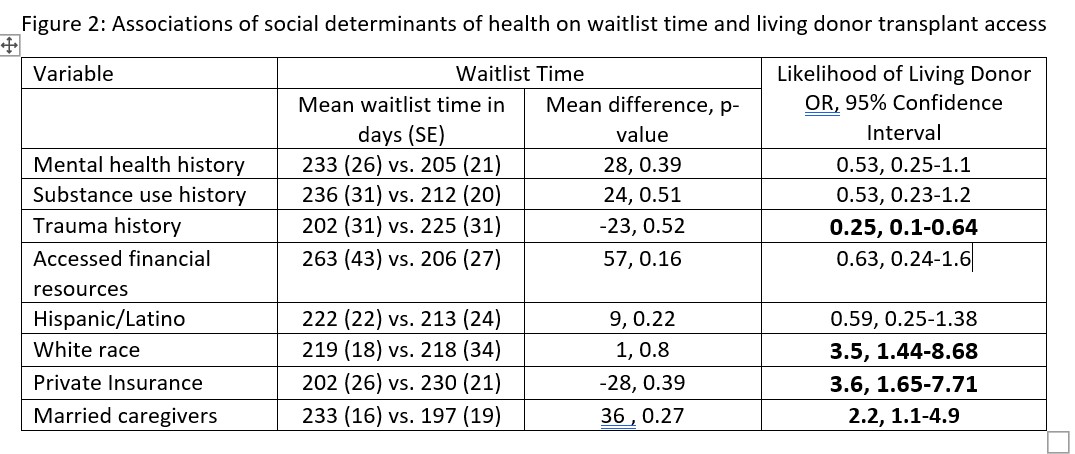Access to Pediatric Kidney Transplant: The Impact of Mental Health Diagnoses and Social Determinants of Health
1Children's Hospital Colorado, Aurora, CO, 2Pharmacy, UNC Hospitals, Chapel Hill, NC
Meeting: 2022 American Transplant Congress
Abstract number: 813
Keywords: Allocation, Kidney, Pediatric, Waiting lists
Topic: Clinical Science » Kidney » 43 - Kidney: Pediatrics
Session Information
Session Time: 5:30pm-7:00pm
 Presentation Time: 5:30pm-7:00pm
Presentation Time: 5:30pm-7:00pm
Location: Hynes Halls C & D
*Purpose: Limited and delayed access to kidney transplant (KT) has been associated with characteristics of adult KT candidates, including mental health (MH) diagnoses, negative social determinants of health (SDH), and racial/ethnic background. We aimed to investigate the association between these factors in pediatric KT recipients (pKTR) and their caregivers (CG), and any resultant impacts on access to KT.
*Methods: This retrospective cohort study investigated pKTR transplanted between 1/2016-3/2021 at our institution. Data collected included baseline demographics plus patient or CG report of MH diagnoses, substance abuse, and trauma identified during KT candidate evaluation. Descriptive statistics were utilized as well as two-sample t-tests, chi square, and logistic regression for tests of significance.
*Results: 117 pKTR were included in our cohort; mean age 13 years (10-16) at time of KT (Figure 1). Patient/CG reported MH diagnoses were more prevalent in pKTR with public insurance (p 0.005) and non-married CG households (p 0.001). Reported MH diagnoses were most prevalent in African American (AA) pKTR (AA 75%, White 53%, Asian 25%, Other/More than one Race 58%, Hispanic/Latino 58%, p 0.68). MH diagnoses were associated with history of trauma and substance use (both with p <0.001). Trauma history was negatively associated with likelihood of receiving a living donor (LD) KT (OR 0.25, 95% Confidence Interval (CI) 0.1-0.64). White race (OR 3.5, CI 1.44-8.68), private insurance (OR 3.6, CI 1.65-7.71), and married CG (OR 2.2, CI 1.1-4.9) were associated with increased likelihood of receiving a LD KT (Figure 2). Our study did not reveal significant associations between waitlist time and SDH or MH diagnoses.
*Conclusions: We identified SDH that are associated with MH history in pKTR and impact access to LD KT in our cohort. Recognizing these factors creates an opportunity for the multidisciplinary transplant team to strategize targeted interventions for identifying and supporting candidates with potential and existing barriers to access pKT and living donations.
To cite this abstract in AMA style:
Blanchette E, Benz E, Armendariz J, McKinnon K, Chandran M, Christofferson ES, Bisek M, Bock M. Access to Pediatric Kidney Transplant: The Impact of Mental Health Diagnoses and Social Determinants of Health [abstract]. Am J Transplant. 2022; 22 (suppl 3). https://atcmeetingabstracts.com/abstract/access-to-pediatric-kidney-transplant-the-impact-of-mental-health-diagnoses-and-social-determinants-of-health/. Accessed February 17, 2026.« Back to 2022 American Transplant Congress


